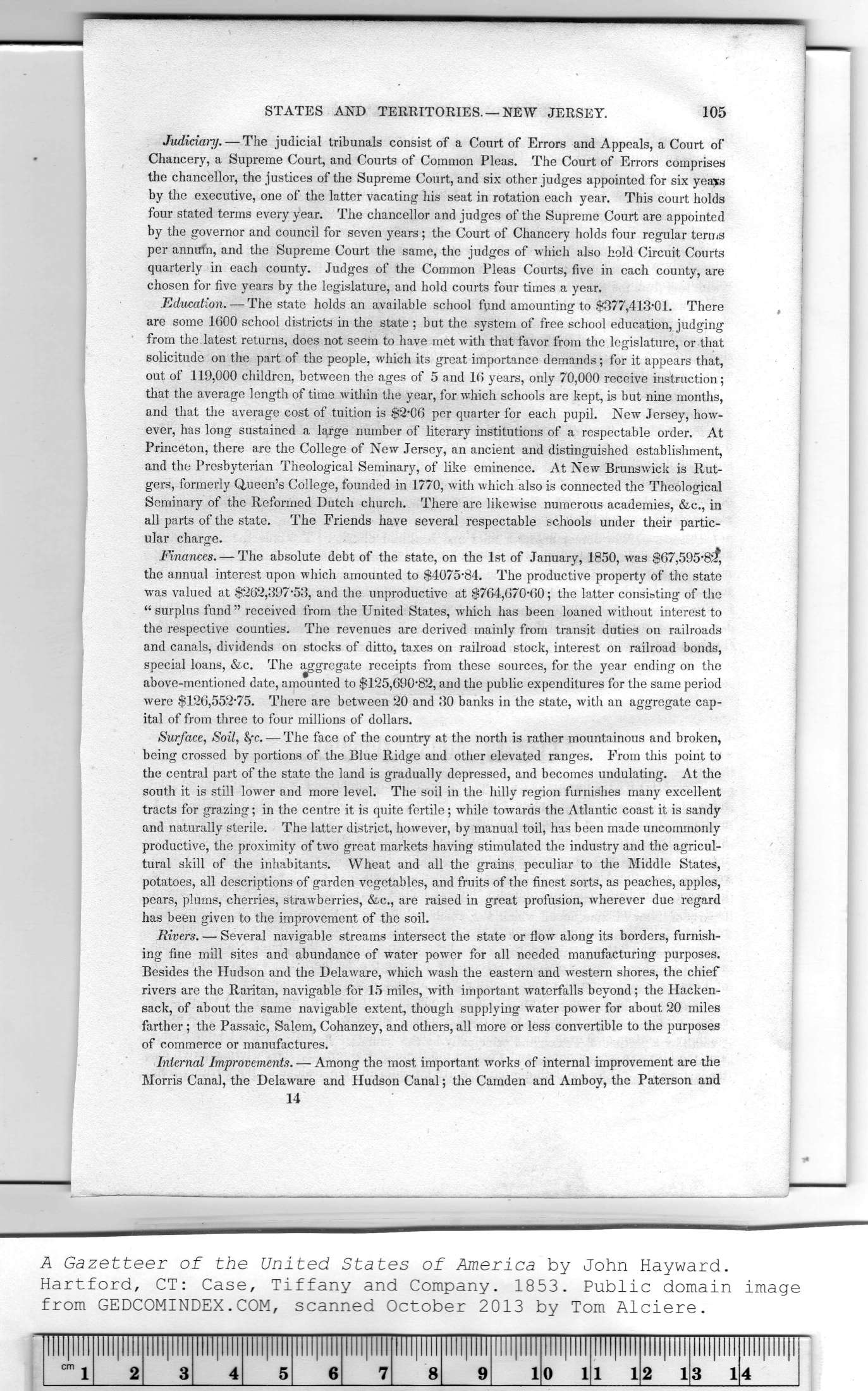|
|
Note: Ctrl and + increases the font size of the text below, Ctrl and - decreases it, and Ctrl and 0 resets it to default size.
STATES AND TERRITORIES. —NEW JERSEY. 105
Judiciary. — The judicial tribunals consist of a Court of Errors and Appeals, a Court of
Chancery, a Supreme Court, and Courts of Common Pleas. The Court of Errors comprises
the chancellor, the justices of the Supreme Court, and six other judges appointed for six ye ays
by the executive, one of the latter vacating his seat in rotation each year. This court holds
four stated terms every year. The chancellor and judges of the Supreme Court are appointed
by the governor and council for seven years; the Court of Chancery holds four regular terms
per annum, and the Supreme Court the same, the judges of which also hold Circuit Courts
quarterly in each county. Judges of the Common Pleas Courts, five in each county, are
chosen for five years by the legislature, and hold courts four times a year.
Education. — The state holds an available school fund amounting to .$377,413-01. There
are some 1600 school districts in the state ; but the system of free school education, judging
from the . latest returns, does not seem to have met with that favor from the legislature, or that
solicitude on the part of the people, which its great importance demands; for it appears that,
out of 119,000 children, between the ages of 5 and 16 years, only 70,000 receive instruction;
that the average length of time within the year, for which schools are kept, is but nine months,
and that the average cost of tuition is $2-06 per quarter for each pupil. New Jersey, how-
ever, has long sustained a large number of literary institutions of a respectable order. At
Princeton, there are the College of New Jersey, an ancient and distinguished establishment,
and the Presbyterian Theological Seminary, of like eminence. At New Brunswick is Rut-
gers, formerly Queen's College, founded in 1770, with which also is connected the Theological
Seminary of the Reformed Dutch church. There are likewise numerous academies, &c., in
all parts of the state. The Friends have several respectable schools under their partic-
ular charge.
Finances. — The absolute debt of the state, on the 1st of January, 1850, was $67,595-8;?,
the annual interest upon which amounted to $4075-84. The productive property of the state
was valued at $262,397*53, and the unproductive at $764,670*60; the latter consisting of the
“ surplus fund" received from the United States, which has been loaned without interest to
the respective counties. The revenues are derived mainly from transit duties on railroads
and canals, dividends on stocks of ditto, taxes on railroad stock, interest on railroad bonds,
special loans, &c. The aggregate receipts from these sources, for the year ending on the
above-mentioned date, amounted to $125,690*82, and the public expenditures for the same period
were $126,552*75. There are between 20 and 30 banks in the state, with an aggregate cap-
ital of from three to four millions of dollars.
Surface, Soil, fyc. — The face of the country at the north is rather mountainous and broken,
being crossed by portions of the Blue Ridge and other elevated ranges. From this point to
the central part of the state the land is gradually depressed, and becomes undulating. At the
south it is still lower and more level. The soil in the hilly region furnishes many excellent
tracts for grazing; in the centre it is quite fertile; while towards the Atlantic coast it is sandy
and naturally sterile. The latter district, however, by manual toil, has been made uncommonly
productive, the proximity of two great markets having stimulated the industry and the agricul-
tural skill of the inhabitants. Wheat and all the grains peculiar to the Middle States,
potatoes, all descriptions of garden vegetables, and fruits of the finest sorts, as peaches, apples,
pears, plums, cherries, strawberries, &c., are raised in great profusion, wherever due regard
has been given to the improvement of the soil.
Rivers. — Several navigable streams intersect the state or flow along its borders, furnish-
ing fine mill sites and abundance of water power for all needed manufacturing purposes.
Besides the Hudson and the Delaware, which wash the eastern and western shores, the chief
rivers are the Raritan, navigable for 15 miles, with important waterfalls beyond; the Hacken-
sack, of about the same navigable extent, though supplying water power for about 20 miles
farther; the Passaic, Salem, Cohanzey, and others, all more or less convertible to the purposes
of commerce or manufactures.
Internal Improvements. — Among the most important works of internal improvement are the
Morris Canal, the Delaware and Hudson Canal; the Camden and Amboy, the Paterson and
14
|
Illllllll
cm j |
Illllllll
2 |
Illllllll
3 |
Illllllll
4 |
Illllllll
5 |
Illllllll
6 |
Illllllll
7 |
Illllllll
8 |
Illllllll
9 |
1 |
Illllllll
0 1 |
Illllllll
1 1 |
Illllllll
2 1 |
Illllllll
3 1 |
llll|llll|l
4 |
|
